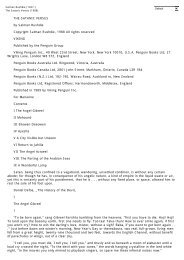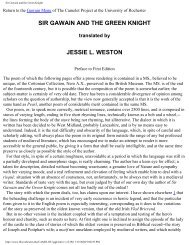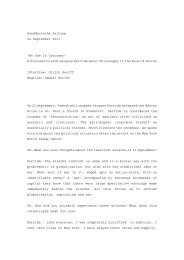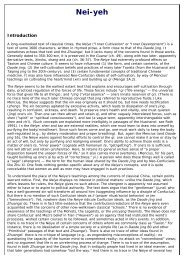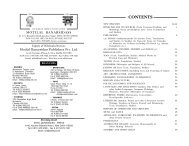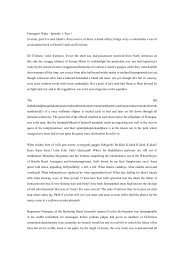Rushdie, Salmon - Th.. - hudson's home on the web
Rushdie, Salmon - Th.. - hudson's home on the web
Rushdie, Salmon - Th.. - hudson's home on the web
You also want an ePaper? Increase the reach of your titles
YUMPU automatically turns print PDFs into web optimized ePapers that Google loves.
At night fa<strong>the</strong>r and s<strong>on</strong> would return exhausted to <strong>the</strong>ir shack by <strong>the</strong> airport runway at Santacruz and<br />
when Ismail's mo<strong>the</strong>r saw him approaching, illuminated by <strong>the</strong> green red yellow of <strong>the</strong> departing jet-planes,<br />
she would say that simply to lay eyes <strong>on</strong> him made all her dreams come true, which was <strong>the</strong> first indicati<strong>on</strong><br />
that <strong>the</strong>re was something peculiar about Gibreel, because from <strong>the</strong> beginning, it seemed, he could fulfil<br />
people's most secret desires without having any idea of how he did it. His fa<strong>the</strong>r Najmuddin Senior never<br />
seemed to mind that his wife had eyes <strong>on</strong>ly for her s<strong>on</strong>, that <strong>the</strong> boy's feet received nightly pressings while<br />
<strong>the</strong> fa<strong>the</strong>r's went unstroked. A s<strong>on</strong> is a blessing and a blessing requires <strong>the</strong> gratitude of <strong>the</strong> blest.<br />
Naima Najmuddin died. A bus hit her and that was that, Gibreel wasn't around to answer her prayers<br />
for life. Nei<strong>the</strong>r fa<strong>the</strong>r nor s<strong>on</strong> ever spoke of grief. Silently, as though it were customary and expected, <strong>the</strong>y<br />
buried <strong>the</strong>ir sadness beneath extra work, engaging in an inarticulate c<strong>on</strong>test, who could carry <strong>the</strong> most<br />
dabbas <strong>on</strong> his head, who could acquire <strong>the</strong> most new c<strong>on</strong>tracts per m<strong>on</strong>th, who could run faster, as though<br />
<strong>the</strong> greater labour would indicate <strong>the</strong> greater love. When he saw his fa<strong>the</strong>r at night, <strong>the</strong> knotted veins<br />
bulging in his neck and at his temples, Ismail Najmuddin would understand how much <strong>the</strong> older man had<br />
resented him, and how important it was for <strong>the</strong> fa<strong>the</strong>r to defeat <strong>the</strong> s<strong>on</strong> and regain, <strong>the</strong>reby, his usurped<br />
primacy in <strong>the</strong> affecti<strong>on</strong>s of his dead wife. Once he realized this, <strong>the</strong> youth eased off, but his fa<strong>the</strong>r's zeal<br />
remained unrelenting, and pretty so<strong>on</strong> he was getting promoti<strong>on</strong>, no l<strong>on</strong>ger a mere runner but <strong>on</strong>e of <strong>the</strong><br />
organizing muqaddams. When Gibreel was nineteen, Najmuddin Senior became a member of <strong>the</strong><br />
lunch-runners' guild, <strong>the</strong> Bombay Tiffin Carriers' Associati<strong>on</strong>, and when Gibreel was twenty, his fa<strong>the</strong>r was<br />
dead, stopped in his tracks by a stroke that almost blew him apart. "He just ran himself into <strong>the</strong> ground,"<br />
said <strong>the</strong> guild's General Secretary, Babasaheb Mhatre himself. "<str<strong>on</strong>g>Th</str<strong>on</strong>g>at poor bastard, he just ran out of<br />
steam." But <strong>the</strong> orphan knew better. He knew that his fa<strong>the</strong>r had finally run hard enough and l<strong>on</strong>g enough<br />
to wear down <strong>the</strong> fr<strong>on</strong>tiers between <strong>the</strong> worlds, he had run clear out of his skin and into <strong>the</strong> arms of his<br />
wife, to whom he had proved, <strong>on</strong>ce and for all, <strong>the</strong> superiority of his love. Some migrants are happy to<br />
depart.<br />
Babasaheb Mhatre sat in a blue office behind a green door above a labyrinthine bazaar, an awesome<br />
figure, buddha-fat, <strong>on</strong>e of <strong>the</strong> great moving forces of <strong>the</strong> metropolis, possessing <strong>the</strong> occult gift of remaining<br />
absolutely still, never shifting from his room, and yet being everywhere important and meeting every<strong>on</strong>e<br />
who mattered in Bombay. <str<strong>on</strong>g>Th</str<strong>on</strong>g>e day after young Ismail's fa<strong>the</strong>r ran across <strong>the</strong> border to see Naima, <strong>the</strong><br />
Babasaheb summ<strong>on</strong>ed <strong>the</strong> young man into his presence. "So? Upset or what?" <str<strong>on</strong>g>Th</str<strong>on</strong>g>e reply, with downcast<br />
eyes: ji, thank you, Babaji, I am okay. "Shut your face," said Babasaheb Mhatre. "From today you live with<br />
me." Butbut, Babaji ... "But me no buts. Already I have informed my goodwife. I have spoken." Please<br />
excuse Babaji but how what why? "I have _spoken_."<br />
Gibreel Farishta was never told why <strong>the</strong> Babasaheb had decided to take pity <strong>on</strong> him and pluck him from<br />
<strong>the</strong> futurelessness of <strong>the</strong> streets, but after a while he began to have an idea. Mrs. Mhatre was a thin<br />
woman, like a pencil beside <strong>the</strong> rubbery Babasaheb, but she was filled so full of mo<strong>the</strong>r-love that she<br />
should have been fat like a potato. When <strong>the</strong> Baba came <str<strong>on</strong>g>home</str<strong>on</strong>g> she put sweets into his mouth with her own<br />
hands, and at nights <strong>the</strong> newcomer to <strong>the</strong> household could hear <strong>the</strong> great General Secretary of <strong>the</strong> B T C A<br />
protesting, Let me go, wife, I can undress myself. At breakfast she spo<strong>on</strong>-fed Mhatre with large helpings of<br />
malt, and before he went to work she brushed his hair. <str<strong>on</strong>g>Th</str<strong>on</strong>g>ey were a childless couple, and young Najmuddin<br />
understood that <strong>the</strong> Babasaheb wanted him to share <strong>the</strong> load. Oddly enough, however, <strong>the</strong> Begum did not<br />
treat <strong>the</strong> young man as a child. "You see, he is a grown fellow," she told her husband when poor Mhatre<br />
pleaded, "Give <strong>the</strong> boy <strong>the</strong> blasted spo<strong>on</strong> of malt." Yes, a grown fellow, "we must make a man of him,<br />
husband, no babying for him." "<str<strong>on</strong>g>Th</str<strong>on</strong>g>en damn it to hell," <strong>the</strong> Babasaheb exploded, "why do you do it to me?"<br />
Mrs. Mhatre burst into tears. "But you are everything to me," she wept, "you are my fa<strong>the</strong>r, my lover, my<br />
baby too. You are my lord and my suckling child. If I displease you <strong>the</strong>n I have no life."<br />
Babasaheb Mhatre, accepting defeat, swallowed <strong>the</strong> tablespo<strong>on</strong> of malt.<br />
He was a kindly man, which he disguised with insults and noise. To c<strong>on</strong>sole <strong>the</strong> orphaned youth he<br />
would speak to him, in <strong>the</strong> blue office, about <strong>the</strong> philosophy of rebirth, c<strong>on</strong>vincing him that his parents were<br />
already being scheduled for re-entry somewhere, unless of course <strong>the</strong>ir lives had been so holy that <strong>the</strong>y<br />
had attained <strong>the</strong> final grace. So it was Mhatre who started Farishta off <strong>on</strong> <strong>the</strong> whole reincarnati<strong>on</strong> business,<br />
and not just reincarnati<strong>on</strong>. <str<strong>on</strong>g>Th</str<strong>on</strong>g>e Babasaheb was an amateur psychic, a tapper of table-legs and a bringer of<br />
spirits into glasses. "But I gave that up," he told his protégé, with many suitably melodramatic inflecti<strong>on</strong>s,<br />
gestures, frowns, "after I got <strong>the</strong> fright of my bloody life."<br />
Once (Mhatre recounted) <strong>the</strong> glass had been visited by <strong>the</strong> most co-operative of spirits, such a<br />
too-friendly fellow, see, so I thought to ask him some big questi<strong>on</strong>s. _Is <strong>the</strong>re a God_, and that glass which<br />
had been running round like a mouse or so just stopped dead, middle of table, not a twitch, completely<br />
phutt, kaput. So, <strong>the</strong>n, okay, I said, if you w<strong>on</strong>'t answer that try this <strong>on</strong>e instead, and I came right out with<br />
it, _Is <strong>the</strong>re a Devil_. After that <strong>the</strong> glass -- baprebap! -- began to shake -- catch your ears! -- slowslow at<br />
first, <strong>the</strong>n faster--faster, like a jelly, until it jumped! -- ai-hai! -- up from <strong>the</strong> table, into <strong>the</strong> air, fell down <strong>on</strong><br />
its side, and -- o-ho! -- into a thousand and <strong>on</strong>e pieces, smashed. Believe d<strong>on</strong>'t believe, Babasaheb Mhatre<br />
told his charge, but <strong>the</strong>nand<strong>the</strong>re I learned my less<strong>on</strong>: d<strong>on</strong>'t meddle, Mhatre, in what you do not<br />
comprehend.



